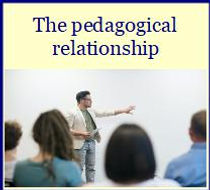
The new pedagogical relationship
The teacher's role is to serve learners
Teachers have knowledge that learners have not yet acquired. Their role is not to simply transfer this knowledge to their students as if they were 'empty', but to guide them in their understanding of their own cerebral workings, using knowledge as a means to achieve this. This allows learners to become aware of those moments when their brains do not do exactly what they want them to, when they want them to. Teachers therefore become helpers, enabling learners to correct themselves, creating an interdependent relationship with the learners they serve.
Teachers are guided by their learners
When learners receive new information to process from their teachers, they work by trial and error as they attempt to select the necessary elements from their memories to perform the task at hand. During this phase, learners will make good and bad choices, meaning that from time to time, they will be able to get their brains to function in the way they really need them to, but at others, they may have the feeling that their brains are simply not 'working properly'.
These 'failed' attempts are an essential part of the thinking process, both for teachers and learners, since they are opportunities to work again on the new information either through a different approach or by helping learners to pinpoint other memory aids, which will enable them to better retrieve the elements when needed in the future. Thus, even though teachers are the ones who set the learning tone by initially introducing learners to the new information, its actually the learners' cerebral reaction that will guide future teacher choices and adjustments in order to overcome any difficulties that may arise.
Teachers are active analysts
An essential part of a teacher's role is to observe learners. Teachers must be constantly focused on their learners in order to decipher the way their brains function. They gently stimulate the brains under their guidance by constructing different challenges, not with a focus on testing and thus grading, but rather on creating a wide range of opportunities that will arise from the learners' 'failed' attempts, enabling deeper thought on individual brain function. Teachers will try to push the limits of their learners' brains, in order to seek a reaction, which, through the need to reposition, will push learners into a greater understanding of themselves.
By proceeding in this way, teachers do not drive learners to failure, even if they are unable to meet the challenge set, since learners who are unable to retrieve the necessary information, will be pinpointing an ineffective memory retrieval strategy. Given that teachers are responsible for helping learners become aware of the best retrieval strategies for them, when learners are unable to select the information they need, their 'failures' are also opportunities for teachers to better develop new memory retrieval techniques. This type of analytical work is something teachers do constantly during the lesson, with each learner.
Neither teachers nor learners position themselves as judges with a need to classify performance against a norm, since teachers clearly position themselves as guides. Nobody should consider themselves as omnipotent or omniscient when it comes to learning how someone else's brain functions. We may, with time, be able to perfect our own understanding of the way our own brain functions, but as teachers serving learners, our goal is to allow our students to reach this same target, through the knowledge we impart, which in fact becomes a cerebral stimulus. Thus, it is the learners who learn to master their brains through a deep understanding of its workings.
Learners are active analysts
In a similar manner to teachers, learners will try to become more aware of how their brains are functioning at each moment. By observing their own 'failed' attempts or those of their classmates, thanks to the finely tuned ear of their teachers, they learn to master their brain operations e.g. it's through the observation that a sound or a word are missing or that a sentence simply doesn't sound right, that learners learn to observe themselves at work and to understand the choices their brains have made. Thus, learners observe themselves at the same time as they train in the target language, in order to locate the brain process used. During their linguistic constructions, learners learn to consciously direct their brains in the desired direction and hence, master the classification and retrieval of information.
Therefore, the learners' goal becomes the pursuit of self understanding, which the new knowledge allows him to acquire, instead of the focus being solely on the ingestion of that knowledge or the development of a skill.
"Mistakes" are essential and beneficial
For both teachers and learners, making mistakes is a constructive and beneficial practice. The more learners and teachers are confronted with a panoply of 'failed' learner retrieval attempts, which reflect a number of 'failed' teacher transmission attempts, the more both will be able to increase their experience and analytical capacities of the learning process, which will strengthen their pedagogical relationship. The quest for positive praise from teachers by learners (along with all the negative postures that such a quest entails), will disappear allowing a relationship based on transparency and trust to develop.
Both teachers and learners take responsibility for their actions during the learning process by admitting their difficulties, their 'failures' and their feelings in order to facilitate a pertinent analysis of the brain under training.

